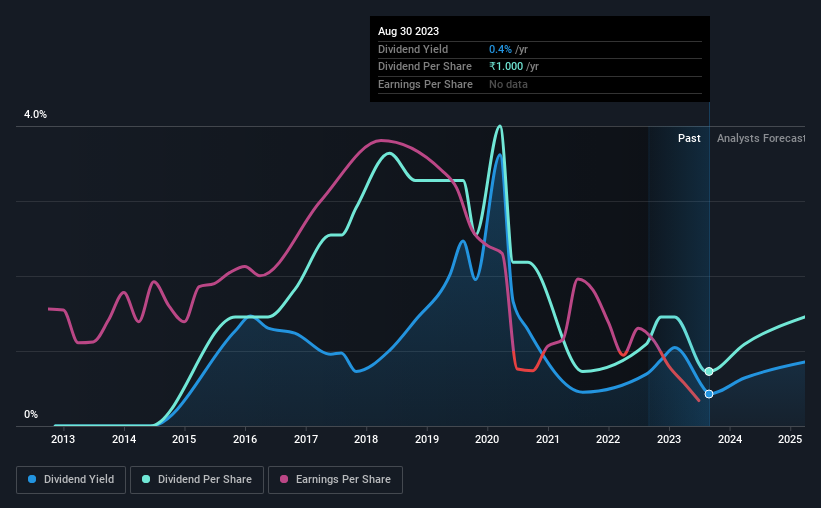- India
- /
- Auto Components
- /
- NSEI:PPAP
PPAP Automotive's (NSE:PPAP) Shareholders Will Receive A Smaller Dividend Than Last Year
PPAP Automotive Limited (NSE:PPAP) is reducing its dividend from last year's comparable payment to ₹0.50 on the 15th of October. Based on this payment, the dividend yield will be 0.4%, which is lower than the average for the industry.
While the dividend yield is important for income investors, it is also important to consider any large share price moves, as this will generally outweigh any gains from distributions. Investors will be pleased to see that PPAP Automotive's stock price has increased by 41% in the last 3 months, which is good for shareholders and can also explain a decrease in the dividend yield.
Check out our latest analysis for PPAP Automotive
PPAP Automotive's Distributions May Be Difficult To Sustain
Even a low dividend yield can be attractive if it is sustained for years on end. Despite not generating a profit, PPAP Automotive is still paying a dividend. Along with this, it is also not generating free cash flows, which raises concerns about the sustainability of the dividend.
Over the next year, EPS might fall by 71.3% based on recent performance. This means the company will be unprofitable and managers could face the tough choice between continuing to pay the dividend or taking pressure off the balance sheet.

PPAP Automotive's Dividend Has Lacked Consistency
Looking back, PPAP Automotive's dividend hasn't been particularly consistent. Due to this, we are a little bit cautious about the dividend consistency over a full economic cycle. The dividend has gone from an annual total of ₹2.00 in 2015 to the most recent total annual payment of ₹1.00. This works out to be a decline of approximately 8.3% per year over that time. A company that decreases its dividend over time generally isn't what we are looking for.
The Dividend Has Limited Growth Potential
Dividends have been going in the wrong direction, so we definitely want to see a different trend in the earnings per share. Over the past five years, it looks as though PPAP Automotive's EPS has declined at around 71% a year. A sharp decline in earnings per share is not great from from a dividend perspective. Even conservative payout ratios can come under pressure if earnings fall far enough.
We're Not Big Fans Of PPAP Automotive's Dividend
To sum up, we don't like when dividends are cut, but in this case the dividend may have been too high to begin with. The company isn't making enough to be paying as much as it is, and the other factors don't look particularly promising either. We don't think that this is a great candidate to be an income stock.
It's important to note that companies having a consistent dividend policy will generate greater investor confidence than those having an erratic one. Still, investors need to consider a host of other factors, apart from dividend payments, when analysing a company. For example, we've identified 5 warning signs for PPAP Automotive (4 are significant!) that you should be aware of before investing. Looking for more high-yielding dividend ideas? Try our collection of strong dividend payers.
New: Manage All Your Stock Portfolios in One Place
We've created the ultimate portfolio companion for stock investors, and it's free.
• Connect an unlimited number of Portfolios and see your total in one currency
• Be alerted to new Warning Signs or Risks via email or mobile
• Track the Fair Value of your stocks
Have feedback on this article? Concerned about the content? Get in touch with us directly. Alternatively, email editorial-team (at) simplywallst.com.
This article by Simply Wall St is general in nature. We provide commentary based on historical data and analyst forecasts only using an unbiased methodology and our articles are not intended to be financial advice. It does not constitute a recommendation to buy or sell any stock, and does not take account of your objectives, or your financial situation. We aim to bring you long-term focused analysis driven by fundamental data. Note that our analysis may not factor in the latest price-sensitive company announcements or qualitative material. Simply Wall St has no position in any stocks mentioned.
About NSEI:PPAP
PPAP Automotive
Manufactures and sells automotive sealing systems and injection-moulded plastic parts in India and internationally.
Moderate risk and slightly overvalued.
Similar Companies
Market Insights
Weekly Picks


Crazy Undervalued 42 Baggers Silver Play (Active & Running Mine)


Fiducian: Compliance Clouds or Value Opportunity?

Willamette Valley Vineyards (WVVI): Not-So-Great Value
Recently Updated Narratives


ADNOC Gas future shines with a 21.4% revenue surge

Watch Pulse Seismic Outperform with 13.6% Revenue Growth in the Coming Years

Significantly undervalued gold explorer in Timmins, finally getting traction
Popular Narratives


MicroVision will explode future revenue by 380.37% with a vision towards success


NVDA: Expanding AI Demand Will Drive Major Data Center Investments Through 2026





